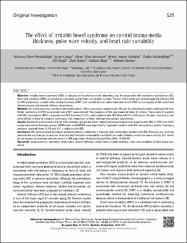| dc.contributor.author | Durakoğlugil, Murtaza Emre | |
| dc.contributor.author | Çanğa, Aytun | |
| dc.contributor.author | Kocaman, Sinan Altan | |
| dc.contributor.author | Akdoğan, Remzi Adnan | |
| dc.contributor.author | Durakoğlugil, Tuğba | |
| dc.contributor.author | Ergül, Elif | |
| dc.contributor.author | Rakıcı, Halil | |
| dc.contributor.author | İlhan, Gökhan | |
| dc.contributor.author | Bostan, Mehmet | |
| dc.date.accessioned | 2020-12-19T20:42:35Z | |
| dc.date.available | 2020-12-19T20:42:35Z | |
| dc.date.issued | 2014 | |
| dc.identifier.citation | Durakoğlugil, ME:, Canga, A., Kocaman, SA., Akdoğan, RA., Durakoğlugil, T. ve diğerleri. (2014). The effect of irritable bowel syndrome on carotid intima-media thickness, pulse wave velocity, and heart rate variability. Anadolu Kardiyoloji Dergisi, 14(6), 525-530. | en_US |
| dc.identifier.issn | 1302-8723 | |
| dc.identifier.issn | 1308-0032 | |
| dc.identifier.uri | https://app.trdizin.gov.tr/makale/TVRjd05qa3pNdz09 | |
| dc.identifier.uri | https://hdl.handle.net/11436/5744 | |
| dc.description.abstract | Objective: Irritable bowel syndrome (IBS), a subgroup of functional somatic disorders, may be associated with autonomic dysfunction (AD). Heart rate variability (HRV), a measure of autonomic dysfunction, may predict survival. The aim of this study was to investigate the effect of IBS on HRV parameters, carotid intima-media thickness (CIMT) and carotid-femoral pulse wave velocity (cf-PWV) as surrogates of AD, subclinical atherosclerosis and arterial stiffness, respectively. Methods: Our study was cross-sectional and observational. Thirty consecutive patients with IBS and 30 control participants underwent 24-hour Holter monitoring, cf-PWV assessment and CIMT measurement. The diagnosis of IBS was based on Rome III criteria. There were 24 patients with IBS-Constipation (80%), 4 patients with IBS-Diarrhea (13.3%), and 2 patients with IBS-Mixed (6.7%) in IBS group. Student t-test and χ2 test were utilized in order to compare continuous and categorical variables between two groups, respectively. Results: Biochemical parameters did not differ between groups except for slightly increased creatinine in patients with IBS. cf-PWV and CIMT values were similar between groups. SDNN index and RMSSD were significantly impaired in patients with IBS compared to controls. Frequency analyses revealed lower LF, HF, and VLF in subjects with IBS. Conclusion: We demonstrated decreased parasympathetic modulation in patients with constipation predominant IBS. However, we could not demonstrate any changes in vascular structure and functions measured by carotid intima-media thickness and pulse wave velocity. Our results do not support accelerated atherosclerosis in IBS population (Anadolu | en_US |
| dc.language.iso | eng | en_US |
| dc.publisher | Turkish Soc Cardiology | en_US |
| dc.rights | info:eu-repo/semantics/openAccess | en_US |
| dc.subject | Kalp ve Kalp Damar Sistemi | en_US |
| dc.subject | Ateroskleroz | en_US |
| dc.subject | Otonomik Disfonksiyon | en_US |
| dc.subject | Ateriyel Sertlik | en_US |
| dc.subject | Karotis İntimamedia Kalınlığı | en_US |
| dc.subject | Kalp Atış Hızı Değişkenliği | en_US |
| dc.subject | Huzursuz Bağırsak Sendromu | en_US |
| dc.title | The effect of irritable bowel syndrome on carotid intima-media thickness, pulse wave velocity, and heart rate variability | en_US |
| dc.type | article | en_US |
| dc.contributor.department | RTEÜ, Tıp Fakültesi, Dahili Tıp Bilimleri Bölümü | en_US |
| dc.contributor.institutionauthor | Durakoğlugil, Murtaza Emre | |
| dc.contributor.institutionauthor | Akdoğan, Remzi Adnan | |
| dc.contributor.institutionauthor | Durakoğlugil, Tuğba | |
| dc.contributor.institutionauthor | Rakıcı, Halil | |
| dc.contributor.institutionauthor | İlhan, Gökhan | |
| dc.contributor.institutionauthor | Bostan, Mehmet | |
| dc.identifier.volume | 14 | en_US |
| dc.identifier.issue | 6 | en_US |
| dc.identifier.startpage | 525 | en_US |
| dc.identifier.endpage | 530 | en_US |
| dc.ri.edit | oa | en_US |
| dc.relation.journal | Anadolu Kardiyoloji Dergisi | en_US |
| dc.relation.publicationcategory | Makale - Uluslararası Hakemli Dergi - Kurum Öğretim Elemanı | en_US |


















